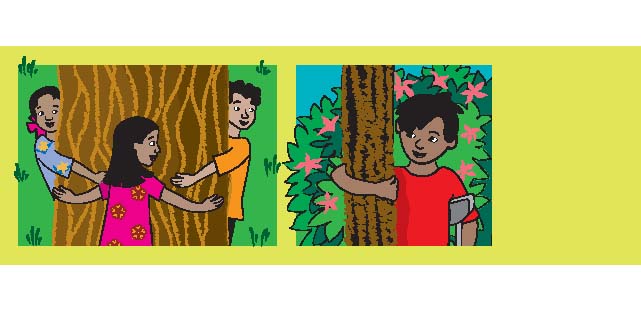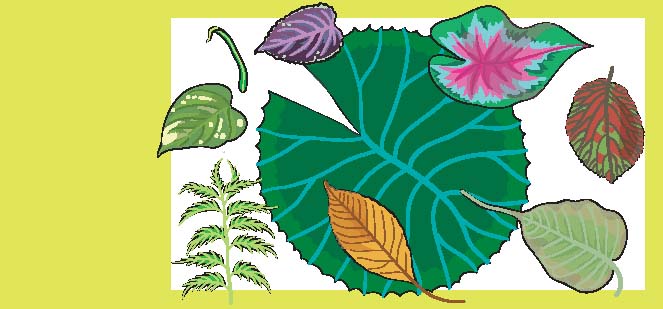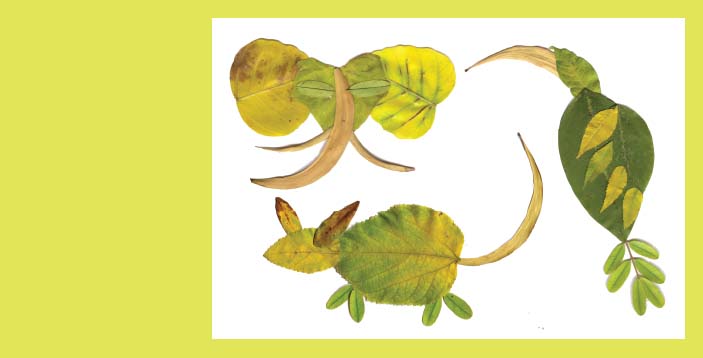Table of Contents

2. The Plant Fairy
Last Sunday, we went to a garden in the neighbourhood. We played Hide and Seek (Chhupanchhupai) and Antakshari. We had a lot of fun. After sometime, Didi said – Let us play a new game today. We had played this game in the camp last year. I will become a ‘Plant fairy’. The ‘Plant fairy’ will call out a name of something and you all will have to touch it.
The game began. Didi said - The ‘Plant fairy’ asks you to touch a plant. At once, all the children ran towards the plants.

** Children can be asked by what name, games like Chhupanchhupai, Antakshari are called in their regions.
11
Didi said - Very good! Every one has touched a plant. But have you noticed that all the plants are different from each other?
Didi, you are also sitting on little plants, said Shabnam. Can you name the plant on which Didi was sitting?
The game started again. The ‘Plant fairy’ now said - Touch a tree which has either a thick or a thin trunk.

The children ran again to touch the trees with thick or thin trunks. Have you seen a tree with a trunk as thick as the one shown in the picture?
Michael found the game very interesting. He thought, how lucky the fairy was. She could order everyone around. Now, I want to be the ‘Plant fairy’ - said Michael. The children laughed aloud - A boy fairy ! They were now ready to take orders from the new ‘Plant fairy’.
Michael said – Get me some leaves quickly.
But remember you are not to pluck the leaves from the plants – said Didi. The children ran to collect the leaves which were lying on the ground.
** By playing this game children will see the diversity in plants for themselves. It would be good if children became the ‘Plant fairy’ by turn so that they themselves can choose the basis of classification.
12
# Do all the leaves have similar colours, shapes and margins?

Dayaram said - I did not know that there were so many types of leaves. Look, some are round, some are long and some are triangular.
Ammu said - They are of so many different colours as well. Some are light green and some are dark green. Some are even yellow, red and purple. There is one which is green but has white patches on it.
Look, even the margins of these leaves are different from each other. Some have straight margins and some uneven. Some of these margins even look like a saw – said Shabnam.
Ammu and Shabnam shouted together - We also want to be the ‘Plant fairy.’
Didi said - Not today, may be next Sunday. It is time to go home now.
On the way back, Didi recited a poem for everyone.
** Children may collect different types of fallen leaves and find out the names of their plants.
13
Leaves
Red, purple and even yellow,
Some green wet and loose,
Leaves are of different kinds,
And of different shapes and shades.
Some are like the elephant’s ears,
And some are playful like the devil,
Some are torn and some are folded,
And some even eaten – like the betel.
And in the early dawn’s darkest hue,
You’ll find the flowers cry tear-like dew.
Some are like butterflies,
some like bees,
Some are hairy and some plain,
Some dry up to look thorns,
And some even resemble cranes.
Whoosh whoosh scuttle and flutter,
In the breeze they all do mutter, All day long they smile and play,
And in the night they sleep away.
Leaves are of different kinds,
And of different shapes and hues.
-- VIJENDRA PAL SISODIYA
(Translated from the Hindi)
** Children like to recite poems, but they should not be forced to memorise them. It will be good if all the children recite the poem as a group in the class.
14
¶- Colour the leaves made around the poem.
- Collect a few leaves of plants like lemon, mango, neem, basil (tulsi ), mint (pudina) and coriander (dhaniya). Crush the leaves and smell them. Do they all smell alike? Can you identify the leaves just by their smell?
- Look at these beautiful pictures. They are made of dry leaves.
- Using dry leaves, make pictures of different animals in your notebook.

** The artist Vishnu Chinchalkar (Indore, Madhya Pradesh) made beautiful pictures using dry leaves. These pictures are inspired by his works.
15
- Didi taught everyone how to take rubbings (prints) of leaves and tree trunks. All you have to do is –

(1) Take a paper and a crayon or colour pencil.
(2) Place the leaf on a table or on the ground. It should be placed in such a way that the side of the leaf with veins is on the top.
(3) Place a paper on the leaf.
(4) Gently rub the crayon or colour pencil on the paper.
(5) Be careful that the paper or the leaf does not move.

- Similarly, take rubbing of the trunk of a tree.
Place a paper on the trunk and rub the crayon or colour pencil on it. Look, you have made rubbing of the tree trunk!
Look at the rubbings made by the others. Are the rubbings of different plants similar?
Which leaf gave a good rubbing?
In case of which tree was the rubbing of the trunk difficult? Why?
16
# Look at the picture and name the things which have patterns of leaves and flowers on them.

** Children may talk to their elders or to a farmer or a gardener for knowing more about plants and discuss in the class.
⇒
-
Look for objects which have patterns of leaves and flowers on them in your house. Write their names.
_____ _____ _____ _____
-
You must have seen many plants and trees. How many of them can you name? Write their names.
_____ _____ _____ _____
_____ _____ _____ _____
-
Are there any plants that you have heard of, but never seen? Which ones.
_____ _____ _____ _____
_____ _____ _____ _____
§
- Ask some older people if there were plants which they have seen when they were children but are not seen these days.
- Also, ask them if there are any plants which can be seen these days, but which were not seen earlier.
¶ Friendship with a tree
Choose a tree near your school or house and make friends with it. A lasting friendship!
- What tree is it? Ask some elders if you don’t know.
- Will you like to give your friend a special name? What will you name it?
** Encourage children to make friends with a tree – water it, look after it and observe it minutely. This will develop their concern for the environment.
18
- Does the tree bear flowers or fruits? Which ones?
- How do the leaves of the tree look?
- Do animals live in the tree? Which ones?
§ Find out more about your tree friend and share it with others.
Draw the picture of your friend-tree below and colour it.
